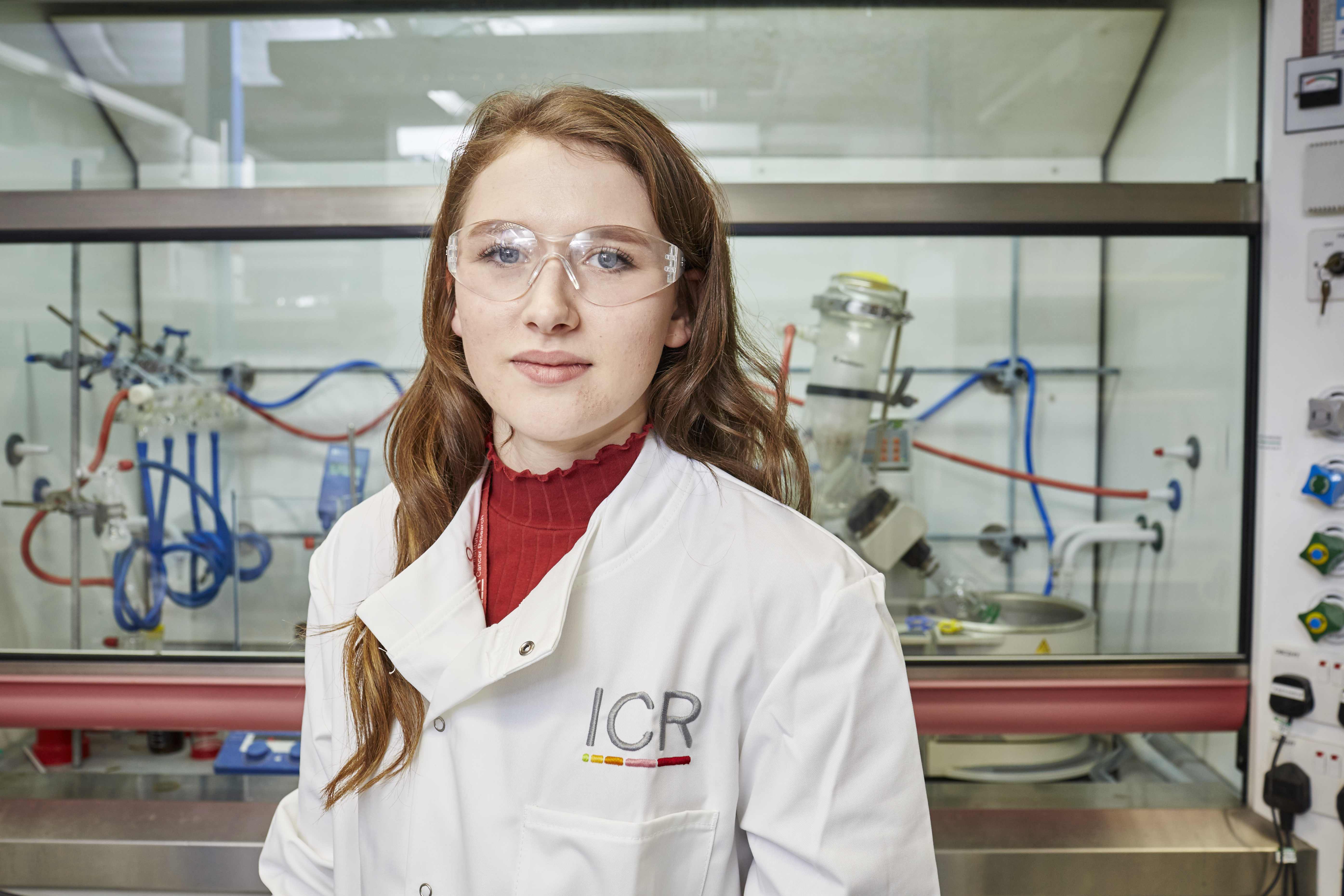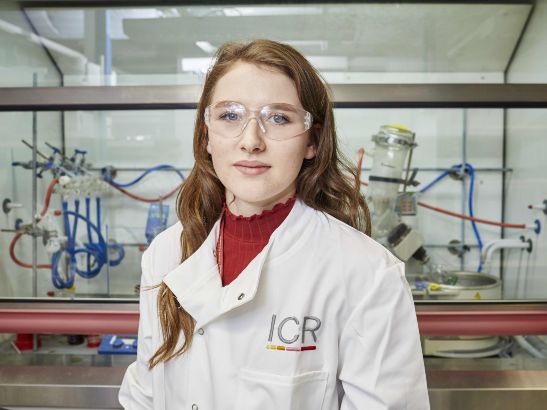It’s been a whirlwind year for us all, with the coronavirus crisis dominating our heads and our headlines for most of 2020.
Our vital research at The Institute of Cancer Research, London, has been on hold for a large chunk of the year, as our researchers, students and staff stayed at home, Much of our science was on hold, discoveries halted, and the future uncertain.
Thankfully, our scientists are now returning to their labs, but while our research was paused, cancer didn’t stop. Our Kickstart ICR appeal was launched to provide urgent support in getting us up-and-running again, and to help us make up for lost time in defeating cancer.
By giving to our Kickstart Appeal you will help us support more talented young researchers like Iona, working on cutting-edge projects that will help us make the discoveries that defeat cancer.
Training the next generation of cancer researchers
As well as being a world-leading cancer research institute, we are a college of the University of London. Ground-breaking research requires outstanding researchers and we have an excellent track record in selecting and developing the very best young scientists.
We spoke to one of our PhD students, Iona Black, on what her research entails, and why she is excited to be back in the lab.
Iona’s project looks to develop chemical compounds that help build understanding of a key cancer-related protein called tankyrase. Her studentship is supported by the Masonic Charitable Foundation.
Iona Black
What is your PhD project looking at?
The aim of my PhD project is to develop chemical tool compounds to study and understand the function of tankyrase, a key cancer related protein. These chemical tools could then have the potential to be further developed into novel treatments which block tankyrase activity in cancer. My project is a collaborative project, between my PhD supervisors, Professor Ian Collins, Head of Chemistry in the Division of Cancer Therapeutics and Dr Sebastian Guettler, a team leader in the Division of Structural Biology.
What makes you passionate about cancer research?
All of us are affected by cancer in some way, with half of us expected to receive a cancer diagnosis in our lifetimes. Experiencing the effects of cancer on my family and my friend’s families has made me passionate about the need for research into further understanding cancer, and how we can use this understanding as scientists to develop new drugs to defeat cancer.
Why is your research/the ICR's work important to you?
At the ICR and in the Division of Cancer Therapeutics, the scientists around me are working to understand cancer biology and cancer evolution, in order to identify proteins that we can target with new and effective treatments. It is important to me that as cancer researchers, we are working towards a point when patients will be able to live with cancer on safe and effective treatments.
What is the student community like at the ICR?
There is a great student community at the ICR – with a relatively small number of students it is easy to get to know one another. I have been involved with the student committee since my first year which has been a great way of meeting other students. We organise regular sports and social activities for students, including hiking, tea and cake wellbeing sessions, and movie nights. We are planning to have some virtual events in the coming months due to social distancing restrictions that are in place.
The ICR is one of the most influential cancer research organisations and among the top higher education institutions in the world for academic influence, therefore being a PhD student at the ICR is great for experiencing research excellence.
Why is fundraising important to the ICR?
Scientific research is only made possible by funding, so without funding for our research it wouldn’t happen. The coronavirus crisis this year has made funding tough, and scientists lost a lot of time away from labs while we stayed at home to comply with lockdown rules. We rely on the support of generous donors, big and small, to make our cutting-edge research possible.
Have you had the opportunity to meet your funders or to be in touch with them?
My PhD is generously fully funded by the Masonic Charitable Foundation, who pledged a grant to the ICR to fund our PhD studentship programme, and I was lucky to benefit from this grant for my PhD project. To keep them updated with my research project, I send them annual progress reports to let them know what has been achieved with the project and our next steps. When the lockdown restrictions have ended, I hope to invite them into the lab to experience my research first-hand.

Tell us a bit about attending Discovery Club this year.
In February, I was able to attend a Discovery Club – an event for the ICR’s philanthropists, held at the Royal Society of Chemistry. Along with my supervisor Professor Ian Collins and with Dr Rob van Montfort, we discussed how scientific researchers from multidisciplinary backgrounds, such as medicinal chemists and structural biologists, work together to develop the cancer drugs of the future. This collaboration between scientific disciplines will continue in our new Centre for Cancer Drug Discovery. I was also able to meet some of the philanthropists and fundraisers whose donations allow our cancer research to happen, and tell them about the techniques that we use in the division to design, test and synthesise new chemical compounds with the potential to be developed into novel cancer therapies.
What are your thoughts on the coronavirus crisis and the impact on cancer patients?
It has been upsetting to hear about the impact of the coronavirus crisis on cancer patients who have had their treatments stopped or surgeries delayed. It is also concerning to know that diagnosis of cancer and cancer referrals from GPs have been delayed during this time, and it highlights the need for novel targeted therapies for more advanced disease which can be taken as tablets at home, such as abiraterone, a prostate cancer drug discovered at the ICR.
What was lockdown life like for you?
Working from home was something I never imagined I would experience in a career as a lab-based researcher! I made good use of my time out of the lab by focusing on writing up results from recent experiments and reviewing the key literature related to my research, which will help me with my final thesis write-up. I spent time learning how to use computational programs which are needed to analyse the results of my experiments, and planned for my return to the lab. I also delivered my first virtual talk at the Division of Cancer Therapeutics second year student talk day – it was very different to presenting at the front of a lecture theatre!
Along with a group of other students, I also organised a weekly quiz to keep ICR staff and their families entertained on Thursday evenings – I was happy to be part of something which encouraged colleagues to stay connected whilst keeping apart!
Why is the Kickstart appeal important?
Unfortunately, the coronavirus lockdown has resulted in cuts to our research funding and the cancellation of many fundraising opportunities, such as the London landmarks half marathon which I was supposed to run in March.
Although I was able to make use of my time during lockdown, vital lab-based research hours have been lost, and cancer patients are more vulnerable due to delays to cancer treatment and diagnosis. It’s really important for us to get back to the lab to make up for lost time and to have the resources we need to kick-start our research back into action to prevent the pandemic from having an even bigger impact on cancer research.
What has it been like to return to the lab after the lockdown period?
I am really happy to be back in the lab after around 3 months in lockdown! It’s been great to see colleagues and other students again (from a social distance). There is clear guidance in place around working on site and I was glad to find out that I hadn’t forgotten how to do any experiments!
What are your immediate priorities now you're back in the lab?
Since returning to the lab, I have managed to synthesise a set of compounds which I designed during lockdown, aided by computational modelling. My next steps will be to test these compounds for their ability to bind to tankyrase and to further develop these compounds into potent chemical tool compounds.
What are your hopes and aspirations for your future career?
I aim to continue a research career in cancer drug discovery, following on from my PhD at the ICR. I want to work alongside other scientists and researchers towards the development of many safe and effective drugs for cancer treatment, which will allow patients to live with cancer as a manageable disease and take the fear out of a cancer diagnosis. For now, I am looking forward to moving my research to the Centre for Cancer Drug Discovery, and to continuing to work with scientists from multidisciplinary backgrounds to discover new drugs to defeat cancer.
Why philanthropy is important to the ICR
We are a charity and rely on the support of partners, Trusts and Foundations, and individuals to fund our work.
Iona’s studentship was made possible by the support of The Masonic Charitable Foundation. They made a generous pledge of £143,440 over four years towards our PhD studentship programme, enabling us to offer an additional studentship to a talented young scientist.
Professor Ian Collins and Dr Sebastian Guettler, who are Iona’s supervisors endorse the importance of fundraising for projects like this. Philanthropic support both enables exciting science and trains the next generation of young scientists.
Professor Collins said:
"We're very grateful to the Masonic Charitable Foundation, whose charitable donation is enabling Iona to work on an exciting project bringing together early research in structural biology and chemistry, with the longer-term potential to help find new drugs to treat cancer."
How you can help
Your support could help us continue to train the cancer leaders of the future. The pandemic has put funding for our PhD students at risk.
Investing in the most ambitious, creative and innovative PhD students benefits not only us, and the wider international cancer research community, but ultimately, cancer patients.
Please donate today to help us make up for lost research hours and to accelerate our research as we return to our laboratories.
